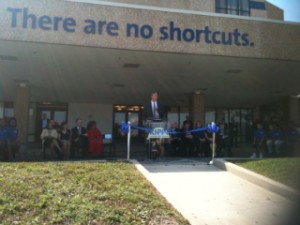Florida education officials hope a new initiative will help the state attract more “high-impact” charter schools into academically struggling urban neighborhoods.
With the promise of $10 million in potential funding, the state is looking to entice six of its largest school districts to compete for grants that would help them launch partnerships with the likes of KIPP, YES Prep, or other organizations with established track records of raising achievement among disadvantaged students.

“We hope that this will lead to some structural or systemic changes of how charter schools and districts can work together toward the common goal of making sure every kid has access to a great school,” said Adam Miller, who leads the school choice office at the Florida Department of Education.
So far, at least two of the state’s large urban districts have indicated they are interested, and another may join the mix before the full proposals come due next month.
State and local education officials, along with philanthropic and business groups in the state’s major cities, have sought to attract “high-impact” charter school networks to high-needs areas of Florida’s inner cities. One of their few high-profile successes to date has been an effort, backed by current Board of Education Chairman Gary Chartrand, to being KIPP schools to Jacksonville.
The state started seeking grant proposals over the summer from school districts that wanted to support similar efforts. The plan is backed by funding from federal Race to the Top grants and national philanthropic groups. Officials hope to amass additional funding from districts and local donors. Six districts are eligible, and under the plan, up to three could ultimately receive roughly $3 million each to support their proposals.
The outside funding boost, coupled with the fact that they’d be collaborating with districts from the outset, are intended to help overcome the barriers that have kept well-known charter networks from opening more schools in Florida. They’re intended to help charter operators get access to facilities, the ability to tap local teaching talent, and certainty that the local district will allow them to open. Districts and charters could also work together on issues like transportation and teacher training.
In a letter to the department describing its intent to apply for one of the grants, the Duval County district notes the current KIPP operation has outperformed comparable district schools with a high-poverty student population. The district indicates it would like to expand its partnership with KIPP.
“By developing or participating in joint district-charter learning communities and professional development, the sharing of ideas and strategies can improve traditional public schools and KIPP,” Duval’s letter states.
Miami-Dade officials indicated they planned to meet with KIPP leaders as well as officials with the Harlem Children’s Zone and YES Prep before crafting their proposal.
Other districts could also apply.
Hillsborough and Pinellas are eligible, but have not formally shown interest.
Orange County submitted a letter to the department indicating it was interested in working with Rocketship Education. However, Chris Bernier, Orange’s associate superintendent in charge of school choice, said in an interview that the district likely would not be submitting a full-blown proposal. He said the district sent the initial letter to position itself to pursue a grant, but after vetting the issue decided not to – in part because it did not have a charter organization to work with. Rocketship has indicated that it is slowing expansion plans around the country.
Broward County School Superintendent Robert Runcie has suggested he is open to collaborating with charter schools, but the district has not made a submission.
“We are aware of the potential opportunity, but have not have not made a commitment at this time,” Jody Perry, Broward’s charter schools director, said in an email.
Several districts indicated they would need the support of their local school boards to proceed. Proposals are expected to be turned in to the department Oct. 17, and selected for funding later in the year.
While they might seem counterintuitive, district-charter collaborations are not unheard of. The Center on Reinventing Public Education lists 20 urban districts around the country that have entered cooperative agreements with charter schools, moving “from relationships of distrust and competition to communication and common interests.”
Some charter school groups have been successful working with historically low-performing student populations that districts continue to struggle with. But districts have their own expertise. They have local knowledge, and can often help charters find facilities or teaching talent.
Adam Emerson, who leads the charter school office at the Department of Education, said Florida’s initiative is different because it’s being driven at the state level, rather than by individual urban districts.
“There’s no current initiative that looks at multiple districts statewide the way we are,” said Emerson, who previously served as editor of redefinED.
The plan also involves bringing in the National Association of Charter School Authorizers to evaluate each district’s plans for working with the charter organizations. Miller, in the department’s choice office, said one of the goals is to draw lessons that can be applied in other places.
“By having multiple districts, we’ll see multiple strategies and we can really assess which ones are working best and which ones aren’t working,” he said.



[…] between the two sectors. The state’s department of education is offering financial incentives, through a new grant program, to help some of its highest-need districts attract charter franchises with solid track records for […]
[…] Uncommon Schools, and Yes Prep have all been identified as some of the high quality charter schools. Thus far, KIPP is the only one of these that has an elementary/middle school in Florida. […]